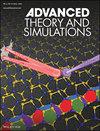纳米孔生物传感器浓度传感的准确度和精密度限制
IF 2.9
4区 工程技术
Q1 MULTIDISCIPLINARY SCIENCES
引用次数: 0
摘要
开发新的诊断方法,深入了解其物理局限性,可以大大提高对癌症等疾病的早期发现。基于纳米孔的单分子传感器正朝着新型诊断应用的发展迅速发展。在本研究中,通过扩展先前对生物细胞中单个受体的传感极限的研究,系统地评估了纳米孔传感器的准确性和精密度。建立了测量噪声对纳米孔传感器精度和准确度影响的数学模型。本文提出了两种方法,用于从噪声纳米孔数据中估计浓度,这表明了精度与精度之间的权衡,强调了优化实际传感器性能的挑战。一个令人惊讶的和反直觉的制度也被确定,即使广泛的信号平均在很长的持续时间不能提高浓度传感精度。本研究的见解将有助于指导基于纳米孔的定量生物传感应用。本文章由计算机程序翻译,如有差异,请以英文原文为准。

Accuracy and Precision Limits of Concentration Sensing Using Nanopore Biosensors
Developing novel diagnostic methods with a deep understanding of their physical limitations can greatly improve the early detection of diseases like cancer. Nanopore-based single-molecule sensors are making rapid advances toward the development of novel diagnostic applications. In this study, the accuracy and precision of nanopore sensors are systematically evaluated by extending previous work on the sensing limits of single receptors in biological cells. A mathematical model is developed to evaluate the effect of measurement noise on the precision and accuracy of nanopore sensors. Two approaches are proposed for estimating concentrations from noisy nanopore data demonstrating an accuracy-precision trade-off that underscores a challenge in optimizing practical sensor performance. A surprising and counter-intuitive regime is also identified where even extensive signal averaging over long durations does not improve the concentration sensing accuracy. The insights from this study will be helpful in guiding nanopore-based quantitative biosensing applications.
求助全文
通过发布文献求助,成功后即可免费获取论文全文。
去求助
来源期刊

Advanced Theory and Simulations
Multidisciplinary-Multidisciplinary
CiteScore
5.50
自引率
3.00%
发文量
221
期刊介绍:
Advanced Theory and Simulations is an interdisciplinary, international, English-language journal that publishes high-quality scientific results focusing on the development and application of theoretical methods, modeling and simulation approaches in all natural science and medicine areas, including:
materials, chemistry, condensed matter physics
engineering, energy
life science, biology, medicine
atmospheric/environmental science, climate science
planetary science, astronomy, cosmology
method development, numerical methods, statistics
 求助内容:
求助内容: 应助结果提醒方式:
应助结果提醒方式:


